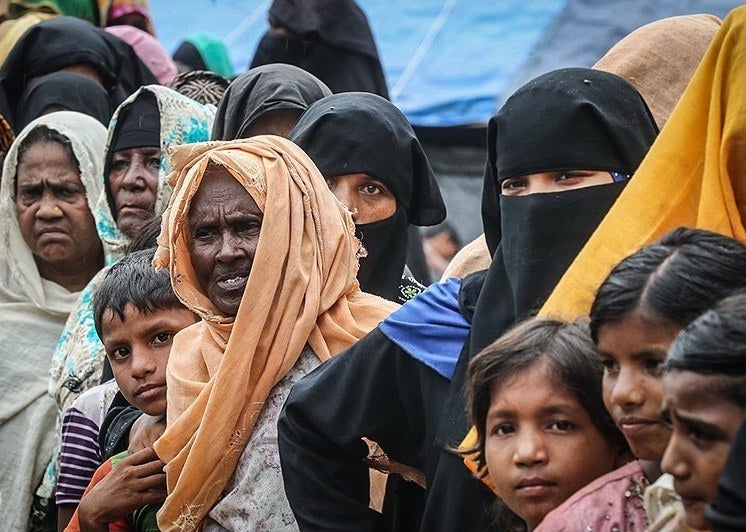While conducting research on religious partnerships in the US, advocate Brie Loskota came across a Jewish organization with a dilemma. Its members wanted to promote Jewish-Muslim dialogue but didn’t understand why no Muslims were showing up at their events. After asking a few questions, Loskota learned that the organization hadn’t asked any Muslims to help plan their “interfaith” activities.
Loskota, the executive director of the Center for Religion and Civic Culture, tells the story of this common mistake in Pluralism in Peril, a new report by the Inclusive America Project. This collection of essays explores how the US can embrace people of all faith backgrounds. It offers guidance to civic and interfaith leaders, youth organizations, philanthropists, and local officials on action steps to build resilient, inclusive communities.
Religious allyship is necessary to combat the surge of hate crimes facing minority groups and pave the way for an increasingly diverse America, but trying to make inroads towards inclusion is easier said than done. These are five common pitfalls to avoid as an ally.
Don’t assume you understand everyone’s religion
According to the American Academy of Religion, religious illiteracy in the US is a widespread phenomenon that “fuels prejudice and antagonism.” While the separation of church and state is foundational to our democracy, public schools can use a non-devotional, academic perspective to give students basic knowledge about different faiths while combating stereotypes and misconceptions. (Teaching about religion is different from teaching religion). Ignorance about other religions reinforces harmful stereotypes and keeps us from fully understanding our neighbors.
Chris Seiple, president emeritus of the Institute for Global Engagement, describes three types of religious knowledge needed for a more inclusive society. The first is knowledge of your own faith or moral guidelines, the second is an understanding of your neighbor’s faith enough to respect it, and the third is the awareness to navigate unfamiliar cultural differences.
Don’t wait until tragedy strikes to reach out and build relationships
The most resilient communities in the world are those in which “the other” has become “the neighbor,” according to national security expert Sarah Morgenthau. Hate crimes against Muslims and other religious minorities rise in the wake of extremist attacks. Incidents of bigotry can make radicalism, no matter the ideology, seem more appealing. Civic and faith leaders must work together to build partnerships long before violence or harassment occurs. Non-Muslims getting to know their Muslim neighbors can counteract this vicious cycle, promoting empathy and understanding about how attacks perpetrated by fringe groups affect the broader community.
Consider the aftermath of the San Bernardino attack, in which relationships between public officials and local Muslim faith leaders led to an efficient police response. This was also true in Fairfax County, Virginia, after the tragic murder of a local girl near her mosque last Ramadan. When right-wing extremists threaten or intimidate minority groups, established cross-community partnerships become essential to the healing process. Organizations like the Shoulder-to-Shoulder campaign are building these bridges. Formed in response to anti-Muslim sentiment, the campaign provides educational materials and support for initiatives that help local faith communities connect.
Don’t let outreach become another item on your to-do list
When planning an interfaith event, it is easy to become preoccupied with logistics like handing out flyers and securing speakers. Outreach to other religious communities can become one more item on a long to-do list. Like the Muslim community in Loskota’s story, the group with less social power becomes a means to an end rather than members of a meaningful partnership.
Interfaith partnerships must be grounded in relationships that are fostered over time. Members of both groups should come together to establish mutual goals and coordinate community-building activities. Only then will these partnerships be based on knowledge, trust, respect, and shared responsibilities and rewards.
Don’t plan all of the parties
Outreach and allyship to other communities often take the form of event-hosting. Yet sometimes being an ally means simply showing up and listening. As New York University chaplain Rabbi Yehuda Sarna, puts it, “Become a solidarity squad rather than a party planner.” When a Muslim prayer room on campus was vandalized with “Trump” written across the door, Jewish students attended a vigil hosted by the Islamic Center at NYU. This allowed natural partnerships and trust to develop resulting in the establishment of new interfaith clubs.
Don’t forget to look outside faith communities
Faith groups aren’t the only ones with a role to play. Civic organizations, government agencies, foundations, academia, and businesses should take the initiative to solve problems facing our communities. In Los Angeles, the University of Southern California Center for Religion and Civic Culture collaborated with faith communities to create an emergency management network. Their grassroots effort led to a preparedness and response system that assists vulnerable groups in the event of a disaster.
It may seem like working across religious divides is difficult, but all it really requires is a willingness to get to know people of different faiths, to empathize with their needs, their fears, and their desires. If you slip up, learn from your mistake and work harder to make it right next time. A strong, pluralist community is worth the effort.
Photo by Steven D. Martin with the National Council of Churches


